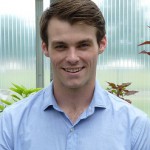
David Byrnes
Rutgers doctoral student David Byrnes has been selected as one of three Kirchner Food Fellows for 2015-2016. The purpose of the Kirchner Food Fellowship program is to foster the development of individuals who have the practical skills and knowledge to make effective investments in emerging agricultural technologies that can address global food security. David Byrnes is a Ph.D. Candidate in Plant Biology and Pathology at Rutgers School of Environmental and Biological Sciences in the Plant Breeding and Genomics track. Byrnes’s dissertation is on selecting African leafy green vegetables as a delivery mechanism for problem micronutrients.
Byrnes has three years of experience contributing to projects in East and Southern Africa using agriculture as a tool for economic growth and improvement of nutritional status for smallholder farmers. Byrnes was named a Borlaug Fellow in Global Food Security in 2013-2014, has authored AgriSETA registered training materials for farmers in Zambia, and has assisted in the planning and installation of low-cost drip irrigation kits for community farms.
While in East Africa, Byrnes observed that the majority of food producers are unable to adopt cost-effective technology due to their inability to access financing, resulting in unstable regional production. This led Byrnes to recognize the fundamental role of capital management on the food supply. By bridging the gap between technology and capital, Byrnes hopes to have a meaningful impact on food security.
The Kirchner Food Fellowship is an opportunity for an elite group of student leaders to be engaged in investment decisions on agriculture-oriented businesses with ground-breaking technologies which can provide long-term sustainable solutions, both environmentally and economically to global food security. Kirchner Food Fellows receive high-level mentoring from networks of investors from across North America. Working directly with the program’s leadership team and their network of thought leaders, the Kirchner Food Fellows engage in a series of face-to-face and on-line educational experiences using learning paradigms that expose them to practical, real-world issues of seed-stage and early-stage investment. As the 16-week program advances, the Fellows are given full discretion to make real investments in real companies based on a predetermined investment mandate.
Mark Robson, chair of the Department if Plant Biology and Pathology, in an announcement to the department, said “I know all of you share my pride and hearty congratulations to David. He continues to distinguish himself as a capable and engaged young scientist.”

